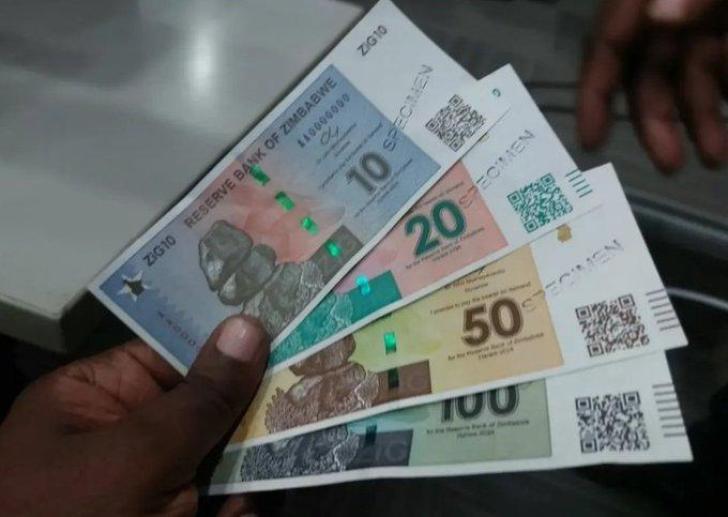News / National
Supermarkets, vendors reject ZiG
01 Oct 2024 at 08:10hrs |
0 Views

In a significant economic shift, supermarkets, vendors, commuter omnibus operators, and tuckshops across Zimbabwe have stopped accepting payments in the local ZiG currency. This decision follows Reserve Bank of Zimbabwe (RBZ) Governor John Mushayavanhu's unexpected 43% devaluation of the currency last week, which has left many Zimbabweans skeptical of its viability.
With prices now predominantly pegged in US dollars, concerns are mounting among citizens about potential losses if they continue to use the less-than-a-year-old ZiG. A tuckshop operator in Dzivarasekwa Extension, Harare, expressed frustration over the situation, stating, "We do not know the rate to use, so it has become difficult for us to continue using the ZiG. What if we accept it and it is further devalued while in my possession?"
As a result of this uncertainty, some routes that previously charged ZiG10 are now demanding US$1, with operators wary of being burdened with depreciating coins introduced in April. Additionally, the ZiG currency has not been accepted for critical purchases such as fuel, duty payments, or rentals, all of which have remained priced in US dollars.
The ZiG was introduced in April, initially trading at US$1: ZWG13 and was positioned as a solution to Zimbabwe's prolonged economic crisis. However, the currency has faced severe devaluation, largely influenced by rampant black market activities. While the RBZ's exchange platform listed the rate at US$1: ZWG14, the black market was reportedly trading it at around ZiG24.
Despite widespread confusion and frustration regarding the devaluation, Mushayavanhu defended his decision, claiming it would ultimately benefit the economy in the long run. In an interview with state-controlled publication The Sunday Mail, he stated, "The resurgence in exchange rate pressures since mid-August has necessitated a firm response." He attributed the recent inflation rate of 1.4% in August - up from an average of -0.82% between April and July - to recent market dynamics that he claimed had destabilized the economy.
Critics, however, have not held back in their condemnation of the currency's rapid decline. Bulawayo Mayor David Coltart voiced strong concerns, questioning the legitimacy of Mushayavanhu's claims that the currency was gold-backed. "Has there ever been a more rapid and precipitous collapse of a currency than the ZiG?" he asked. "Has there ever been a more brazen misrepresentation regarding the backing of a currency - i.e., that it was backed by gold?"
As the economy continues to grapple with instability, the rejection of the ZiG currency by traders and operators signals a growing lack of confidence in the local currency and raises questions about the future of Zimbabwe's monetary policy.
With prices now predominantly pegged in US dollars, concerns are mounting among citizens about potential losses if they continue to use the less-than-a-year-old ZiG. A tuckshop operator in Dzivarasekwa Extension, Harare, expressed frustration over the situation, stating, "We do not know the rate to use, so it has become difficult for us to continue using the ZiG. What if we accept it and it is further devalued while in my possession?"
As a result of this uncertainty, some routes that previously charged ZiG10 are now demanding US$1, with operators wary of being burdened with depreciating coins introduced in April. Additionally, the ZiG currency has not been accepted for critical purchases such as fuel, duty payments, or rentals, all of which have remained priced in US dollars.
The ZiG was introduced in April, initially trading at US$1: ZWG13 and was positioned as a solution to Zimbabwe's prolonged economic crisis. However, the currency has faced severe devaluation, largely influenced by rampant black market activities. While the RBZ's exchange platform listed the rate at US$1: ZWG14, the black market was reportedly trading it at around ZiG24.
Despite widespread confusion and frustration regarding the devaluation, Mushayavanhu defended his decision, claiming it would ultimately benefit the economy in the long run. In an interview with state-controlled publication The Sunday Mail, he stated, "The resurgence in exchange rate pressures since mid-August has necessitated a firm response." He attributed the recent inflation rate of 1.4% in August - up from an average of -0.82% between April and July - to recent market dynamics that he claimed had destabilized the economy.
Critics, however, have not held back in their condemnation of the currency's rapid decline. Bulawayo Mayor David Coltart voiced strong concerns, questioning the legitimacy of Mushayavanhu's claims that the currency was gold-backed. "Has there ever been a more rapid and precipitous collapse of a currency than the ZiG?" he asked. "Has there ever been a more brazen misrepresentation regarding the backing of a currency - i.e., that it was backed by gold?"
As the economy continues to grapple with instability, the rejection of the ZiG currency by traders and operators signals a growing lack of confidence in the local currency and raises questions about the future of Zimbabwe's monetary policy.
Source - newzimbabwe
Join the discussion
Loading comments…
































